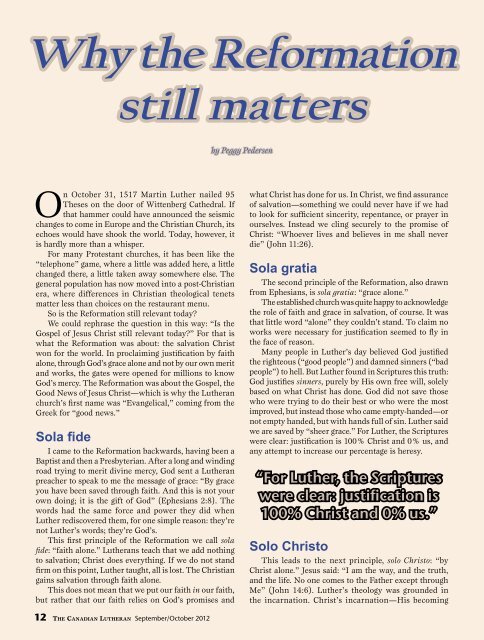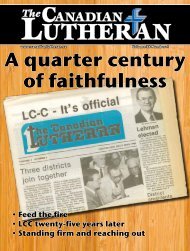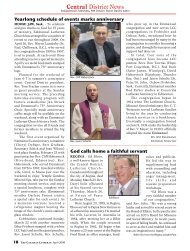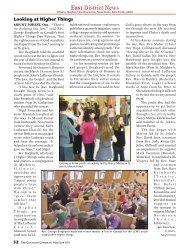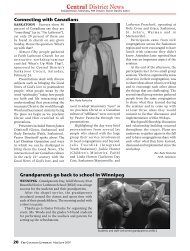ANADIAN LUTHERANISM TODAY - Lutheran Church-Canada
ANADIAN LUTHERANISM TODAY - Lutheran Church-Canada
ANADIAN LUTHERANISM TODAY - Lutheran Church-Canada
Create successful ePaper yourself
Turn your PDF publications into a flip-book with our unique Google optimized e-Paper software.
Why the Reformation<br />
still matters<br />
On October 31, 1517 Martin Luther nailed 95<br />
Theses on the door of Wittenberg Cathedral. If<br />
that hammer could have announced the seismic<br />
changes to come in Europe and the Christian <strong>Church</strong>, its<br />
echoes would have shook the world. Today, however, it<br />
is hardly more than a whisper.<br />
For many Protestant churches, it has been like the<br />
“telephone” game, where a little was added here, a little<br />
changed there, a little taken away somewhere else. The<br />
general population has now moved into a post-Christian<br />
era, where differences in Christian theological tenets<br />
matter less than choices on the restaurant menu.<br />
So is the Reformation still relevant today?<br />
We could rephrase the question in this way: “Is the<br />
Gospel of Jesus Christ still relevant today?” For that is<br />
what the Reformation was about: the salvation Christ<br />
won for the world. In proclaiming justification by faith<br />
alone, through God’s grace alone and not by our own merit<br />
and works, the gates were opened for millions to know<br />
God’s mercy. The Reformation was about the Gospel, the<br />
Good News of Jesus Christ—which is why the <strong>Lutheran</strong><br />
church’s first name was “Evangelical,” coming from the<br />
Greek for “good news.”<br />
Sola fide<br />
I came to the Reformation backwards, having been a<br />
Baptist and then a Presbyterian. After a long and winding<br />
road trying to merit divine mercy, God sent a <strong>Lutheran</strong><br />
preacher to speak to me the message of grace: “By grace<br />
you have been saved through faith. And this is not your<br />
own doing; it is the gift of God” (Ephesians 2:8). The<br />
words had the same force and power they did when<br />
Luther rediscovered them, for one simple reason: they’re<br />
not Luther’s words; they’re God’s.<br />
This first principle of the Reformation we call sola<br />
fide: “faith alone.” <strong>Lutheran</strong>s teach that we add nothing<br />
to salvation; Christ does everything. If we do not stand<br />
firm on this point, Luther taught, all is lost. The Christian<br />
gains salvation through faith alone.<br />
This does not mean that we put our faith in our faith,<br />
but rather that our faith relies on God’s promises and<br />
12 THE C<strong>ANADIAN</strong> LUTHERAN September/October 2012<br />
by Peggy Pedersen<br />
what Christ has done for us. In Christ, we find assurance<br />
of salvation—something we could never have if we had<br />
to look for sufficient sincerity, repentance, or prayer in<br />
ourselves. Instead we cling securely to the promise of<br />
Christ: “Whoever lives and believes in me shall never<br />
die” (John 11:26).<br />
Sola gratia<br />
The second principle of the Reformation, also drawn<br />
from Ephesians, is sola gratia: “grace alone.”<br />
The established church was quite happy to acknowledge<br />
the role of faith and grace in salvation, of course. It was<br />
that little word “alone” they couldn’t stand. To claim no<br />
works were necessary for justification seemed to fly in<br />
the face of reason.<br />
Many people in Luther’s day believed God justified<br />
the righteous (“good people”) and damned sinners (“bad<br />
people”) to hell. But Luther found in Scriptures this truth:<br />
God justifies sinners, purely by His own free will, solely<br />
based on what Christ has done. God did not save those<br />
who were trying to do their best or who were the most<br />
improved, but instead those who came empty-handed—or<br />
not empty handed, but with hands full of sin. Luther said<br />
we are saved by “sheer grace.” For Luther, the Scriptures<br />
were clear: justification is 100% Christ and 0% us, and<br />
any attempt to increase our percentage is heresy.<br />
“For Luther, the Scriptures<br />
were clear: justification is<br />
100% Christ and 0% us.”<br />
Solo Christo<br />
This leads to the next principle, solo Christo: “by<br />
Christ alone.” Jesus said: “I am the way, and the truth,<br />
and the life. No one comes to the Father except through<br />
Me” (John 14:6). Luther’s theology was grounded in<br />
the incarnation. Christ’s incarnation—His becoming


